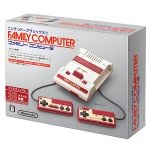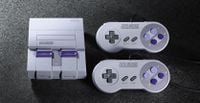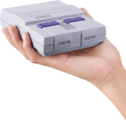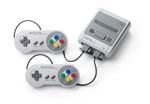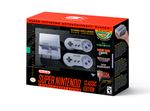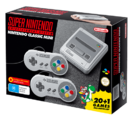Classics
- Not to be confused with Classic NES Series.
Classics, also known as the Nintendo Classic Mini in PAL regions, is a series of small consoles that contain a set number of pre-installed video games representing a specific console era. So far, only the NES Classic Edition, Nintendo Classic Mini: Famicom (Japanese only), and SNES Classic Edition have been confirmed.
NES Classic Edition
The NES Classic Edition (known as the Nintendo Classic Mini: Nintendo Entertainment System in Europe and Australia) is a smaller version of the Nintendo Entertainment System, which was announced on July 14, 2016, and is the first entry to the Classics series. For this iteration, it uses an HDMI cable, which is packaged with the console and, rather than using cartridges, includes 30 NES titles pre-installed. The games feature suspend points, allowing the player to resume where they last left off at a later time. The console also comes with a controller based on the original NES Controller, but with a connector based on those used by Wii Nunchuks, which can also be used to play Virtual Console NES games on Wii or Wii U by connecting it to a Wii Remote. The NES Classic Edition also supports Wii Classic Controllers. It was released in Australia on November 10, 2016, and in the Americas and Europe on November 11, 2016.[1] A Japanese version of the NES Classic Edition, the Nintendo Classic Mini: Family Computer, was released exclusively in Japan on the same day, and includes a slightly different software line-up than its overseas counterpart.
The Mario games included in the console are as follows:
- Donkey Kong
- Donkey Kong Jr.
- Dr. Mario
- Mario Bros.
- Super Mario Bros.
- Super Mario Bros. 2
- Super Mario Bros. 3
Upon the system's release, stores sold out of the NES Classic Edition almost immediately after they went up for sale. Nintendo has recognized this and stated there will be a "steady flow of additional systems through the holiday shopping season and into the new year."[2] On April 2017, a Nintendo representative informed IGN that the system was being discontinued, and the final shipments would be sent out that month.[3]
- NES Classic Edition.png
Hand holding NES Classic Edition as scale.
- NES Classic Edition.jpg
The US packaging
- NintendoClassicNES UK.jpg
The UK packaging
Nintendo Classic Mini: Family Computer
On September 29, 2016, Nintendo announced the Japanese version of the NES Classic Edition, the Nintendo Classic Mini: Family Computer.[4] Similar to its overseas equivalent, it includes 30 pre-installed Family Computer games, although some of the games are different from those on the NES Classic Edition due to region exclusivity. While playing a game, players are able to save to up to four Restore Points at any time.[5] It was released in Japan alongside the NES Classic Edition on November 10, 2016.
The Mario games included in the system are:
- Donkey Kong
- Dr. Mario
- Mario Bros.
- Mario Open Golf
- Super Mario Bros.
- Super Mario Bros. 3
- Super Mario USA
Super NES Classic Edition
This section is about an upcoming console. Editors must cite sources for all contributions to this section. Edits that do not follow this standard may be reverted without notice.
Do not upload any leaked images or media files before this console is released. Per our policy, any such files will be immediately deleted.
The Super NES Classic Edition (known as the Nintendo Classic Mini: Super Nintendo Entertainment System in Europe and Australia and Nintendo Classic Mini: Super Famicom in Japan) is a smaller version of the Super Nintendo Entertainment System and the successor to the NES Classic Edition, which was announced on June 26, 2017.[6] It includes 21 pre-installed SNES titles, and like the original SNES, its physical design varies by region. Unlike its predecessor, the SNES Classic Edition now comes packaged with two Super NES Classic Edition controllers. It will be released in the Americas and Europe on September 29, 2017, in Australia on September 30[7], and in Japan on October 5[8].
The Mario games included in the console are as follows:
- Super Mario World
- Super Mario Kart
- Donkey Kong Country
- Super Mario World 2: Yoshi's Island
- Super Mario RPG: Legend of the Seven Stars
Notes and references
- ^ Nintendo. (July 14, 2016). Nintendo Classic Mini: Nintendo Entertainment System. Nintendo UK. Retrieved July 14, 2016.
- ^ https://twitter.com/NintendoAmerica/status/797124318706601984
- ^ http://www.ign.com/articles/2017/04/13/nintendo-discontinues-the-nes-classic-edition?abthid=58efc43a733f92f66f00000d
- ^ Nintendo. (September 29, 2016). ファミコンが、手のひらサイズで"再"登場!. Nintendo. Retrieved September 30, 2016.
- ^ Nintendo. (September 29, 2016). ニンテンドークラシックミニ ファミリーコンピュータ 紹介映像. YouTube. Retrieved September 30, 2016.
- ^ https://twitter.com/NintendoAmerica/status/879369032947847168
- ^ Nintendo announces the Nintendo Classic Mini: Super Nintendo Entertainment System. Nintendo.com.au. Retrieved June 27, 2017.
- ^ ファミコンに続いて、スーパーファミコンが小さくなって再登場!. Nintendo. Retrieved June 27, 2017.


